Cryotherapy treatment of perianal adenoma in a dog
Cryosurgery, perianal gland tumor, dog
Cryotherapy treatment of perianal adenoma in a dog
Cryosurgery, perianal gland tumor, dog,
- ISSN: 2602-3490
- Yayın Aralığı: Yılda 3 Sayı
- Başlangıç: 2007
- Yayıncı: İstanbul Veteriner Hekimler Odası
Patellar groove replacement with prothesis in cats and dogs
Didar AYDIN KAYA, Sevda ŞENSOY, Zihni MUTLU, Kemal ALTUNATMAZ
Methods of differential diagnosis of vestibular syndromes
Effect of platelet-rich fibrin (PRF) in non-union treatment
Zeynep Tol LAÇALAR, Kemal ALTUNATMAZ, Ebru ERAVCI YALIN
Comparison of shredding traits in meat and dairy cattle breeds
Minimal invasive plate osteosynthesis in veterinary orthopaedics
Çağıl ÇOKCOŞKUN YILMAZ, Cenk YARDIMCI
Alternative clinical approaches to the treatment of pruritis related to canine atopic dermatitis
Deniz Zeynep TELCİ, Semih İZMİRLİ, Mehmet Erman OR, Banu DOKUZEYLÜL
Medical and operative management of odontoid process (dens) fracture in a cat : a case report
Esra ACAR, Ebru ERAVCI YALIN, Eylem BEKTAS BİLGİC
Oncolytic virotherapy and the current approaches in veterinary medicine
Bengü BİLGİÇ, Banu DOKUZEYLÜL, Erman OR
Sümeyye TOYGA, Gülay YÜZBAŞIOĞLU, Funda YILDIRIM, Ahmet GÜLÇUBUK
